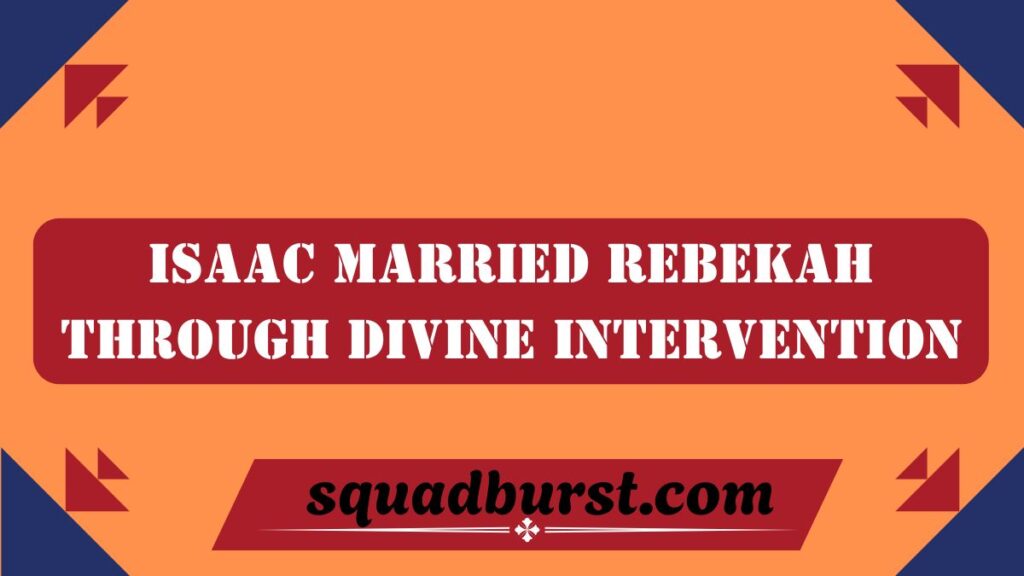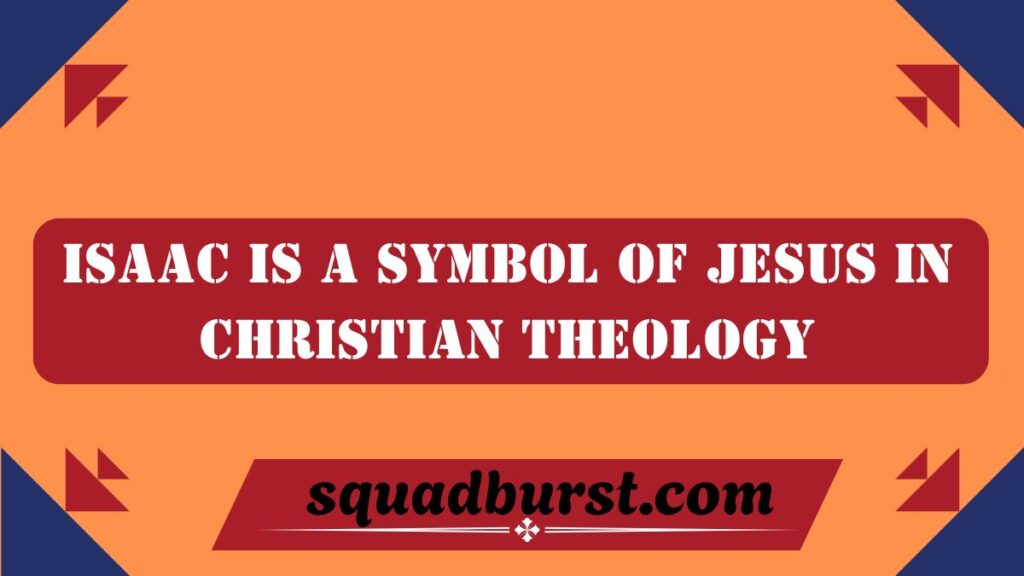11 Interesting Facts About Isaac from the Bible encompasses the remarkable life story of Abraham’s promised son, whose name means “laughter” and whose journey shaped biblical history. Isaac stands as the second patriarch in God’s covenant line, bridging the gap between his father Abraham’s pioneering faith and his son Jacob’s transformation into Israel. Interesting Facts About Isaac from the Bible His story unfolds through miraculous birth, divine tests, peaceful leadership, and prophetic significance.
Interesting Facts About Isaac from the Bible Isaac’s life reads like an ancient treasure map filled with supernatural encounters, family drama, and divine interventions that seem almost too incredible to believe. 11 Interesting Facts About Isaac from the Bible This quiet patriarch witnessed God stop a sacrifice at the last second, found his perfect wife through angelic guidance, and lived11 Interesting Facts About Isaac from the Bible 180 years while maintaining unwavering faith through every challenge life threw his way.
The 11 Interesting Facts About Isaac from the Bible reveal hidden depths in a character often overshadowed by his more dramatic father and cunning son.11 Interesting Facts About Isaac from the Bible From his role as a Christ-like symbol to his masterful conflict resolution skills, Isaac’s story contains powerful lessons about patience, faith, and God’s perfect timing that resonate powerfully with modern believers seeking authentic spiritual growth.
Isaac’s Name Means “Laughter”
The Isaac meaning in Hebrew carries deep significance that reflects the circumstances of his birth. Isaac’s name, derived from the Hebrew Yitzchak, literally translates to “he will laugh” or “laughter.”
This wasn’t just a random choice. Both Abraham and Sarah laughed when God promised them a child in their old age. Genesis 17:17 records Abraham’s reaction: “Abraham fell facedown; he laughed and said to himself, ‘Will a son be born to a man a hundred years old? Will Sarah bear a child at the age of ninety?'”
Sarah’s response mirrors this incredulity. Genesis 18:12 states: “So Sarah laughed to herself as she thought, ‘After I am worn out and my lord is old, will I now have this pleasure?'”
Key aspects of Isaac’s name significance:
- Prophetic meaning: The name predicted the joy his birth would bring
- Divine humor: God transformed doubt into celebration
- Memorial purpose: Every time someone called his name, they remembered God’s faithfulness
- Covenant reminder: The laughter represented the fulfillment of impossible promises
When Isaac was finally born, Sarah declared in Genesis 21:6: “God has brought me laughter, and everyone who hears about this will laugh with me.” The laughter meaning transformed from skepticism to pure joy, demonstrating how God turns our doubts into testimonies of His power.
Isaac Was Born Through God’s Promise

Isaac’s birth through God’s promise stands as one of the most remarkable miraculous births in Scripture. This wasn’t merely a late-in-life pregnancy; it was a supernatural intervention that defied natural possibilities.
Abraham was 100 years old when Isaac was born, while Sarah was 90. Medical impossibility became divine possibility. Genesis 21:5 confirms: “Abraham was a hundred years old when his son Isaac was born to him.”
The promise itself came with specific timing. God’s promise to Abraham and Isaac included detailed specifications:
| Aspect | Details |
|---|---|
| Timing | Within one year (Genesis 18:10) |
| Parents | Abraham and Sarah specifically |
| Purpose | To establish God’s covenant |
| Significance | Foundation for chosen nation |
Elements that made this birth miraculous:
- Sarah’s barrenness: She had been unable to conceive throughout her fertile years
- Advanced age: Both parents were far beyond natural childbearing years
- Physical impossibility: Sarah’s body had “ceased to be with women” (Genesis 18:11)
- Divine timing: The birth occurred exactly as God predicted
This miraculous birth established a pattern. God often works through impossible circumstances to demonstrate His sovereignty. Isaac’s arrival proved that God’s covenant reaffirmed transcends human limitations and natural laws.
The birth also fulfilled the specific covenant promise made to Abraham. Genesis 17:19 records God’s words: “Yes, but your wife Sarah will bear you a son, and you will call him Isaac. I will establish my covenant with him as an everlasting covenant for his descendants after him.”
Abraham Almost Sacrificed Isaac
The Abraham and Isaac Bible story reaches its most dramatic moment in the test on Mount Moriah. This account, found in Genesis 22:2, presents one of the most challenging passages in Scripture: “Take your son, your only son, whom you love—Isaac—and go to the region of Moriah. Sacrifice him there as a burnt offering on a mountain I will show you.”
Isaac’s sacrifice on Mount Moriah wasn’t just a test of Abraham’s faith; it revealed profound theological truths about sacrifice, obedience, and divine provision.
The journey to Mount Moriah involved several key elements:
- Three-day journey: Time for Abraham to contemplate and potentially change his mind
- Isaac’s questions: The son asked about the missing sacrifice animal
- Abraham’s faith declaration: “God himself will provide the lamb” (Genesis 22:8)
- Isaac’s cooperation: He willingly allowed himself to be bound
- Divine intervention: God stopped the sacrifice at the crucial moment
The substitute sacrifice came in the form of a ram caught in a thicket. This moment established the principle of substitutionary atonement that would later find its ultimate fulfillment in Christ.
Theological implications of this event:
- Test of ultimate loyalty: Would Abraham love God more than his promised son?
- Demonstration of faith: Abraham believed God could raise Isaac from the dead (Hebrews 11:19)
- Prophetic foreshadowing: The event pointed to God’s future sacrifice of His own Son
- Divine provision: God always provides what He requires
Isaac’s role in this narrative shows remarkable faith and obedience. As a young man, he could have resisted, but he trusted both his father and his father’s God. This cooperation demonstrates the peaceful nature that would characterize his entire life.
The location itself carries significance. Mount Moriah later became the site of Solomon’s Temple, connecting Isaac’s near-sacrifice to the entire sacrificial system that would follow.
Isaac Married Rebekah Through Divine Intervention

The Isaac and Rebekah’s marriage represents one of the most beautiful examples of divine intervention in marriage found in Scripture. Unlike modern dating approaches, this union demonstrates how God orchestrates relationships according to His perfect plan.
Abraham, concerned about finding the right wife for Isaac, sent his servant on a specific mission. The servant’s prayer in Genesis 24:12-14 shows remarkable faith: “Lord, God of my master Abraham, make me successful today, and show kindness to my master Abraham. See, I am standing beside this spring, and the daughters of the townspeople are coming out to draw water. May it be that when I say to a young woman, ‘Please let down your jar that I may have a drink,’ and she says, ‘Drink, and I’ll water your camels too’—let her be the one you have chosen for your servant Isaac.”
The divine orchestration included:
- Specific prayer criteria: Clear signs to identify God’s choice
- Immediate answer: Rebekah appeared before the prayer ended
- Character revelation: Her kindness exceeded the requested sign
- Family confirmation: Rebekah’s family recognized God’s hand
- Personal consent: Rebekah willingly agreed to the marriage
Rebekah’s character traits that made her suitable:
| Trait | Evidence | Significance |
|---|---|---|
| Kindness | Watered camels without being asked | Showed servant’s heart |
| Industry | Drew water for ten camels | Demonstrated work ethic |
| Beauty | Described as very beautiful | Physical attraction included |
| Purity | Virgin, as Scripture notes | Moral integrity |
| Faith | Willing to leave family for unknown | Trusted God’s plan |
The first meeting between Isaac and Rebekah occurred in a field where Isaac had gone to meditate. Genesis 24:67 beautifully concludes: “Isaac brought her into the tent of his mother Sarah, and he married Rebekah. So she became his wife, and he loved her; and Isaac was comforted after his mother’s death.”
This divine intervention established several important principles:
- God cares about marriage partnerships
- Prayer should guide relationship decisions
- Character matters more than external factors
- God’s timing is perfect
- Love can grow within God’s design
Isaac Prayed for His Wife to Have Children
Isaac’s prayers for Rebekah demonstrate his role as spiritual leader of his household. When Rebekah remained barren for twenty years after their marriage, Isaac didn’t simply accept the situation—he interceded with God on her behalf.
Genesis 25:21 records this pivotal moment: “Isaac prayed to the Lord on behalf of his wife, because she was childless. The Lord answered his prayer, and his wife Rebekah became pregnant.”
Key aspects of Isaac’s prayer life:
- Persistent intercession: He prayed for twenty years without giving up
- Husband’s responsibility: He took spiritual leadership seriously
- Faith in God’s promises: He believed God would honor the covenant
- Patient waiting: He didn’t seek alternative solutions like Abraham did with Hagar
The pregnancy that resulted wasn’t ordinary. Rebekah conceived twins who struggled within her womb, prompting her own prayer for understanding. God revealed that two nations were forming within her—Jacob and Esau.
Lessons from Isaac’s prayer pattern:
- Intercessory responsibility: Husbands should pray for their wives
- Persistent faith: Long delays don’t mean denied prayers
- God’s sovereignty: Divine timing often differs from human expectations
- Family legacy: Children are gifts that require spiritual investment
This prayer demonstrates Isaac’s close relationship with God. Rather than becoming bitter about the delay or seeking human solutions, he maintained faith and continued seeking God’s intervention. The eventual answer exceeded expectations, providing not just one child but twins who would become the fathers of entire nations.
Isaac Was Known for His Peaceful Nature
Isaac’s peaceful character distinguishes him from other biblical patriarchs. While Abraham was known for his faith and Jacob for his cunning, Isaac exemplified gentleness and reconciliation throughout his life.
This peaceful disposition manifested most clearly in Isaac and disputes over wells. When conflicts arose with the Philistines over water rights—a serious matter in arid regions—Isaac consistently chose peace over confrontation.
Genesis 26:19-22 details three specific well disputes:
| Well Name | Isaac’s Response | Outcome |
|---|---|---|
| Esek | Moved away when challenged | Avoided conflict |
| Sitnah | Relocated again when disputed | Maintained peace |
| Rehoboth | Finally found uncontested space | “Room for all” |
Isaac’s response to each challenge reveals his character: “So Isaac moved away from there and encamped in the Valley of Gerar, where he settled” (Genesis 26:17).
Characteristics of Isaac’s peaceful nature:
- Conflict avoidance: Preferred withdrawal to fighting
- Long-term thinking: Valued relationships over temporary gains
- Resource sharing: Believed in abundance rather than scarcity
- Faith in provision: Trusted God to provide adequate resources
- Generational wisdom: Avoided creating lasting enemies
This peaceful approach ultimately proved successful. Genesis 26:28-29 records how even his former adversaries recognized God’s blessing on Isaac: “We saw clearly that the Lord was with you; so we said, ‘There ought to be a sworn agreement between us’—between us and you. Let us make a treaty with you that you will do us no harm, just as we did not harm you but always treated you well and sent you away peacefully.”
Isaac’s peaceful strategy accomplished several important goals:
- Preserved relationships that could be restored later
- Demonstrated faith in God’s ability to provide
- Modeled conflict resolution for future generations
- Maintained family reputation for integrity
- Avoided unnecessary bloodshed and lasting feuds
This peaceful personality didn’t indicate weakness but rather strength under control. Isaac possessed the resources and manpower to fight but chose the path of peace, demonstrating mature leadership and deep trust in God’s provision.
Isaac Had a Close Relationship with God
Isaac’s encounter with God wasn’t limited to the dramatic moment on Mount Moriah. Throughout his life, Isaac maintained ongoing communion with the Almighty, receiving direct revelations and experiencing God’s guidance.
Genesis 26:24 records a specific divine encounter: “That night the Lord appeared to him and said, ‘I am the God of your father Abraham. Do not be afraid, for I am with you; I will bless you and will increase the number of your descendants for the sake of my servant Abraham.'”
Elements of Isaac’s relationship with God:
- Direct communication: God spoke to him personally
- Covenant confirmation: He received the same promises as Abraham
- Divine protection: God assured him during difficult times
- Spiritual inheritance: He maintained his father’s faith tradition
- Worship practices: He built altars and called on God’s name
God’s reassurance to Isaac came during a time of particular stress. Famine had struck the land, and Isaac was tempted to go to Egypt as his father had done. Instead, God instructed him to remain in Gerar, promising blessing and protection.
The divine promises to Isaac included:
- Land inheritance: All the territory promised to Abraham
- Numerical descendants: Offspring as numerous as stars
- Universal blessing: All nations blessed through his lineage
- Divine presence: God’s continual companionship
- Protection: Safety from enemies and natural disasters
Isaac’s response showed genuine faith. Genesis 26:25 states: “Isaac built an altar there and called on the name of the Lord. There he pitched his tent, and there his servants dug a well.”
This pattern of worship, settlement, and provision became Isaac’s standard response to God’s revelations. He didn’t just receive God’s promises passively but actively engaged in worship and practical preparation.
Isaac’s spiritual leadership extended to his household. He maintained the covenant practices established by Abraham, ensuring continuity of faith across generations. His servants and family understood his commitment to serving the God of Abraham.
Isaac’s Sons, Jacob and Esau, Became the Fathers of Two Nations

Isaac and his sons Jacob and Esau represent one of the most complex family dynamics in Scripture. These twin sons not only inherited their father’s legacy but became the fathers of two nations—Israel and Edom.
The prophecy concerning these twins came before their birth. When Rebekah sought understanding about the struggle in her womb, God revealed: “Two nations are in your womb, and two peoples from within you will be separated; one people will be stronger than the other, and the older will serve the younger” (Genesis 25:23).
Contrasts between Jacob and Esau:
| Characteristic | Jacob | Esau |
|---|---|---|
| Birth order | Second (younger) | First (older) |
| Physical traits | Smooth skin | Hairy, red |
| Personality | Quiet, thoughtful | Outdoorsy, impulsive |
| Skills | Domestic, strategic | Hunting, physical |
| Father’s preference | Less favored initially | Isaac’s favorite |
| Mother’s preference | Rebekah’s favorite | Less favored |
| Spiritual interest | Valued birthright | Despised birthright |
The legacy of Jacob and Esau extended far beyond personal rivalry. Jacob became Israel, father of the twelve cohorts. Esau became the patriarch of the Edomites, a nation that would have ongoing interactions with Israel throughout biblical history.
Significant events in their relationship:
- Birthright sale: Esau traded his inheritance for a meal
- Blessing deception: Jacob received Isaac’s primary blessing through trickery
- Flight and exile: Jacob fled to avoid Esau’s anger
- Eventual reconciliation: The brothers reunited peacefully years later
- Separate destinies: They established distinct national identities
Isaac’s role as father to these dramatically different sons reveals his human limitations. His favoritism toward Esau created family tension, while Rebekah’s preference for Jacob led to deception and division.
God’s sovereignty through family dysfunction:
Despite the family’s imperfections, God’s covenant reaffirmed continued through the promised line. Jacob, despite his flaws, became the carrier of the covenant promises. This demonstrates how God works through human weakness to accomplish His purposes.
The fathers of two nations prophecy fulfilled itself precisely. Israel (Jacob’s descendants) and Edom (Esau’s descendants) became neighboring peoples with complex relationships that played out over centuries of biblical history.
Isaac Lived a Long Life
Isaac’s long life in the Bible spanned 180 years, making him one of the longest-lived patriarchs. Genesis 35:28-29 records: “Isaac lived a hundred and eighty years. Then he breathed his last and died and was gathered to his people, old and full of years. And his sons Esau and Jacob buried him.”
This longevity represented more than mere biological survival—it demonstrated God’s blessings on Isaac throughout multiple generations.
Timeline of Isaac’s long life:
| Age Range | Major Events | Significance |
|---|---|---|
| 0-37 | Birth to mother’s death | Formative years |
| 37-40 | Marriage to Rebekah | Adult establishment |
| 40-60 | Waiting for children | Testing patience |
| 60-137 | Raising Jacob and Esau | Active fatherhood |
| 137-180 | Grandchildren era | Elder statesman |
Blessings evident in Isaac’s longevity:
- Health and vitality: He remained active into advanced age
- Family continuity: He saw multiple generations of descendants
- Material prosperity: His wealth continued growing throughout life
- Spiritual legacy: He maintained covenant faithfulness
- Peaceful death: He died surrounded by family
The phrase “old and full of years” suggests satisfaction and completeness. Isaac hadn’t merely survived; he had thrived and fulfilled his divine purpose.
Factors contributing to Isaac’s long life:
- Divine blessing: God’s supernatural favor extended his days
- Peaceful lifestyle: His non-confrontational nature reduced stress
- Pastoral life: Outdoor living and physical activity promoted health
- Strong family bonds: Loving relationships supported wellbeing
- Spiritual foundation: Faith provided purpose and stability
Isaac’s death marked the end of an era. Both sons, despite their earlier conflicts, united to honor their father. This reconciliation over Isaac’s grave demonstrated his lasting influence as a peacemaker.
The 180 years also provided sufficient time for God’s promises to begin manifesting. IThe saac lived to see his family grow and his descendants multiply, witnessing the early stages of the covenant’s fulfillment.
Isaac Is a Symbol of Jesus in Christian Theology

11 Interesting Facts About Isaac from the Bible Isaac as a symbol of Jesus represents one of the most profound typological relationships in Christian theology. The parallels between Isaac’s story and Christ’s sacrifice provide rich insight into God’s redemptive plan.
Isaac as foreshadowing of Jesus appears throughout the sacrifice narrative on Mount Moriah. These connections weren’t coincidental but represented intentional divine design.
Key parallels between Isaac and Jesus:
| Isaac | Jesus | Significance |
|---|---|---|
| Son of promise | Son of God | Both born through divine intervention |
| Beloved son | “My beloved Son” | Unique relationship with father |
| Willing sacrifice | Voluntary death | Both submitted to father’s will |
| Carried wood | Carried cross | Bore instrument of sacrifice |
| Mount Moriah | Calvary | Same geographical region |
| Substitute provided | He was the substitute | God’s provision for sin |
Isaac as a type of Christ extends beyond the sacrifice scene. His entire life foreshadowed aspects of Jesus’ ministry and character:
- Miraculous birth: Both born when natural birth seemed impossible
- Peaceful nature: Both were known for gentleness and reconciliation
- Covenant bearer: Both carried God’s promises to humanity
- Blessing to nations: Both brought blessing to all peoples
- Resurrection imagery: Isaac symbolically “rose from the dead” when spared
The substitute sacrifice principle established at Mount Moriah reached its fulfillment in Christ. When God provided a ram instead of Isaac, He demonstrated that He would ultimately provide the perfect sacrifice for humanity’s sin.
Theological implications:
- Substitutionary atonement: God accepts a substitute for guilty parties
- Divine provision: God supplies what He requires
- Father’s love: God demonstrates love through sacrifice
- Obedience rewarded: Faithful submission brings blessing
- Prophetic revelation: Old Testament events predict New Testament realities
Isaac in the Old Testament served as a living prophecy pointing forward to Christ. Early Christians recognized these connections and used them to explain the gospel to Jewish audiences familiar with Isaac’s story.
The redemptive plan through Isaac shows God’s consistent character across time. The same God who spared Isaac ultimately sacrificed His own Son, demonstrating both justice and mercy in perfect balance.
Key Takeaways About Isaac
Lessons from Isaac’s life provide timeless wisdom for believers seeking to understand God’s plan and develop mature faith. This biblical figure Isaac demonstrates how ordinary faithfulness can accomplish extraordinary purposes.
Primary lessons from Isaac’s story:
- God keeps His promises, even when circumstances seem impossible
- Patient faith often receives greater rewards than hasty action
- Peaceful approaches to conflict often prove most effective
- Prayer changes situations that seem hopeless
- Family relationships require wisdom, patience, and divine guidance
- Divine provision comes to those who trust and obey
- Legacy matters more than immediate success
Isaac’s example for believers includes both strengths to emulate and weaknesses to avoid:
Strengths to emulate:
- Deep prayer life and communion with God
- Peaceful resolution of conflicts
- Patience during long waiting periods
- Faithfulness to family responsibilities
- Trust in God’s provision and timing
Weaknesses to learn from:
- Parental favoritism that created family division
- Passive leadership during crucial family moments
- Allowing deception to flourish in his household
The importance of Isaac in biblical history cannot be overstated. He served as the crucial link between Abraham’s initial call and Jacob’s transformation into Israel. Without Isaac’s faithful stewardship of the covenant, God’s plan for humanity would have faced a critical gap.
Isaac’s connection to God’s plan demonstrates how seemingly quiet, ordinary lives can serve extraordinary purposes. While Abraham blazed new trails and Jacob wrestled with angels, Isaac simply remained faithful day by day. This steady consistency proved equally essential to God’s purposes.
Modern applications from Isaac’s life:
- Trust God’s timing even when promises seem delayed
- Maintain peace even when others create conflict
- Pray persistently for family needs and relationships
- Value character over external achievements
- Prepare the next generation for their divine calling
The story of Isaac in the Bible ultimately points to God’s faithfulness across generations. From the laughter of his naming to the tears at his death, Isaac’s life testified to divine grace, human weakness, and the triumph of God’s purposes through imperfect people.
11 Interesting Facts About Isaac from the Bible His legacy continues inspiring believers who seek to live faithfully in their own ordinary yet significant roles in God’s ongoing story of redemption.
FAQs
Q: What does Isaac’s name mean in the Bible?
Isaac’s name means “laughter” in Hebrew (Yitzchak), reflecting the joy and laughter his miraculous birth brought to Abraham and Sarah in their old age.
Q: How old was Isaac when Abraham almost sacrificed him?
Most biblical scholars estimate Isaac was between 25-37 years old during the sacrifice on Mount Moriah, old enough to carry wood and understand what was happening.
Q: Who did Isaac marry and how did they meet?
Isaac married Rebekah, who was chosen through divine intervention when Abraham’s servant prayed for God’s guidance at a well in Mesopotamia.
Q: How long did Isaac live according to the Bible?
Isaac lived 180 years, making him one of the longest-lived biblical patriarchs, and died peacefully surrounded by his sons Jacob and Esau.
Q: Why is Isaac considered a symbol of Jesus Christ?
Isaac represents Jesus as both were beloved sons offered as sacrifices by their fathers, with Isaac’s near-sacrifice on Mount Moriah foreshadowing Christ’s crucifixion.
Conclusion
These 11 Interesting Facts About Isaac from the Bible reveal a remarkable man whose quiet faithfulness changed history. From his miraculous birth as the “son of laughter” to his peaceful nature that resolved conflicts, Isaac’s story demonstrates God’s power working through ordinary people. 11 Interesting Facts About Isaac from the Bible His willingness to trust God during the Mount Moriah sacrifice and his patient prayers for children show deep faith that believers can emulate today.
The 11 Interesting Facts About Isaac from the Bible also highlight his prophetic significance as a symbol of Jesus Christ. 11 Interesting Facts About Isaac from the Bible His role as the crucial link between Abraham and Jacob ensured God’s covenant promises continued through generations. Isaac’s 180-year life blessed not only his immediate family but all humanity through his lineage. His legacy teaches us that steady obedience and peaceful character often accomplish more than dramatic actions in God’s eternal plan.

Emma Grace is a creative contributor to Squad Burst, blending her love for fashion and sports into captivating content. Her fresh perspective and relatable voice make her a favorite among readers who share her passion for style and athleticism.





